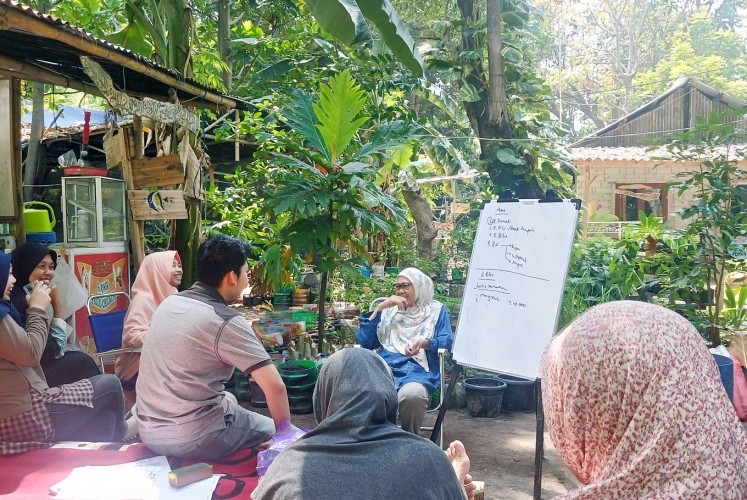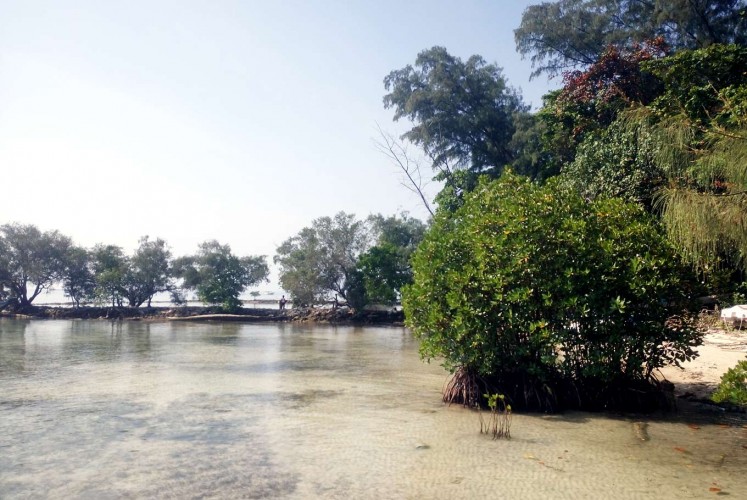Mahariah: Instilling new, green household habits
The prestigious Kalpataru environmental award has boosted the spirits of an activist in her battle to save the marine ecosystem of the Thousand Islands regency.
Change Size
 Mahariah received the Kalpataru Award on last Wednesday for her long-term dedication to rejuvenating the environment of Pramuka Island and neighboring Panggang Island. (JP/Moses Ompusunggu)
Mahariah received the Kalpataru Award on last Wednesday for her long-term dedication to rejuvenating the environment of Pramuka Island and neighboring Panggang Island. (JP/Moses Ompusunggu)
W
ithin the remaining forest on an island on Saturday, nine local residents sat casually on a bamboo bench, their full attention on a bespectacled woman.
The woman, Mahariah, enthusiastically explained to them her plans to plant more trees on the island. Although she had just arrived as that morning, Mahariah seemed energetic as ever after spending a few days in mainland Jakarta to receive the Kalpataru Award, the highest accolade given to Indonesia’s eco-defenders.
The government awarded Mahariah on last Wednesday for her long-term dedication to rejuvenating the environment of Pramuka Island and neighboring Panggang Island. The two islands had suffered major changes as a result of mass tourism, destructive fishing and pollution caused mainly by waste from mainland Jakarta.
Mahariah was among 10 environmentalists from across Indonesia who received the award.
“After receiving the award, I asked myself: ‘Do I really deserve the award?’ Because what we have done here is just the first step,” said Mahariah.
Born in Panggang Island subdistrict in 1970, Mahariah has lived there her entire life, so she is no stranger to the drastic social and environmental changes in Panggang and Pramuka islands. The islands are situated in the northern part of Thousand Islands and fall mostly within the territory of the Thousand Islands Marine National Park.
Mahariah, who works as a teacher at Islamic elementary school MIN 17 in Panggang Island, lamented the unchecked housing development on the island.
“When I was still an elementary school student, there was a mangrove forest behind my school. Now it’s gone,” she said, adding that local residents reclaimed the area illegally to build more houses.
Housing development is inevitable on Panggang Island, which covers an area of 9 ha and houses more than 4,600 people. It has a population density of 511 residents per hectare, much higher than the World Health Organization (WHO) standard of 80 citizens per ha.
During the 1970s, the marine ecosystem of the waters off Panggang and Pramuka islands was healthy and pristine. The condition changed gradually in the subsequent two decades, when fishermen started to use potassium to catch fish and residents got involved in illegal reclamation to build hotels and houses.
“Saltwater intrusion occurs on Panggang Island because we lost our mangroves, which can protect groundwater. We’re trying to prevent it from happening on Pramuka Island by protecting the environment as early as we can,” said Mahariah.

Her desire to better protect the environment of the two islands made her accept an offer in 2003 to join a local forum that aimed to create solutions to combat the degrading marine environment.
In 2006, local residents chose Mahariah to chair the center of village natural conservation (SPKP), a group tasked with implementing conservation values in activities conducted on the two islands.
“After chairing the SPKP, I began to have a wider perspective on the problems. Apart from the degrading coastal areas, we also face waste problems,” said Mahariah.
The proximity of the Thousand Islands to Jakarta benefits the islanders economically, with more tourists visiting the island chain regency. At the same time, however, the rise in tourism has created ecological problems, because waste from the 13 major rivers in mainland Jakarta and industrial activities in North Jakarta have found their way to enter the sea surrounding the Thousand Islands.
Waste not only contributed to the degradation of coral reefs in the regency, but also threatened the mangrove restoration project that Mahariah and residents initiated in 2004.
In 2009, Mahariah created a community called Laut Bukan Tempat Sampah(the sea is not a trash can), gaining support from the Jakarta Animal Aid Network (JAAN), which also struggled with the waste problem in running its Brahminy kite conservation program in the regency. In the community’s capacity, Mahariah enticed students from kindergarten to senior high school to collect trash on beaches and sort them for recycling into handicrafts by local women.
Mahariah believes that waste management programs should be done continuously. This is why she has spent a lot of time over the past two years to develop her Rumah Hijau (Green House) movement, which aims to kick-start an environmental revolution from the basic level of society: households.
“After one program ended, locals would return to what they were doing prior to taking part in that program. Using this movement, I want to start [awareness] at households, so protecting the environment will become a new way of life,” she said.

Rumah Hijau is headquartered in what forest remains on Pramuka Island. From the weekly meetings held in the forest, Mahariah commands the movement’s developments, comprising many initiatives such as sorting household waste as well as creating biopores and cultivating vegetables in home gardens.
Mahariah said women played a pivotal part in Rumah Hijau, for they could encourage their children and husbands to take part in revamping the environment. Thirty-five women are current members of the movement and represent 35 households on the two neighboring islands.
Although this figure is still low compared to the 1,786 total households that exist on the two islands, Mahariah said the most important aspect of the movement was its members’ eagerness to adopt a new lifestyle in managing trash.
“I only recruit around 25 women every year,” she said.
Mahariah also hopes residents in mainland Jakarta will contribute to saving the marine ecosystem of Thousand Islands regency by managing their own waste.
“Whether we might face environmental problems in the future also depends on our friends in the mainland,” said Mahariah.









